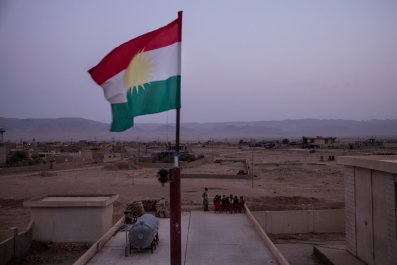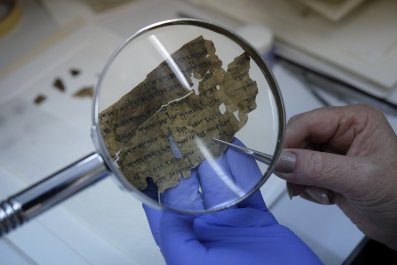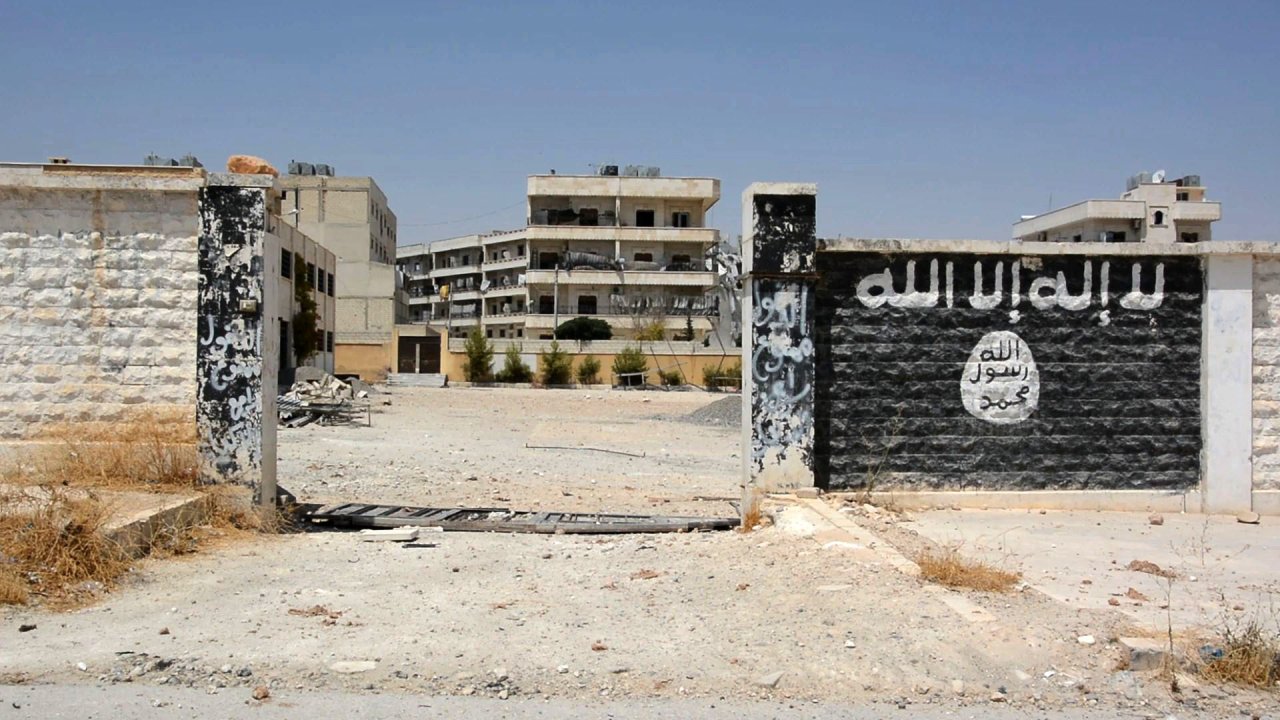
The Islamic State militant group (ISIS) is as brutal in its private orders to its top commanders as it is in its public propaganda, according to a letter obtained by Newsweek, sent when the group was threatened in the northern Syrian city of Manbij in August.
As ISIS fighters struggled to keep control of Manbij against encroaching U.S.-backed Kurdish and Arab forces, an unnamed emir of the group's War Committee in Raqqa, its de facto capital, dispatched a three-page, handwritten communique to the top ISIS commander in the city, Abu Yahya al-Shami. The letter ordered al-Shami to execute defecting fighters, quash dissent in its ranks and imprison "bewitched" militants—a message analysts say the ISIS leadership will communicate to its commanders in Mosul in the face of a U.S.-Iraqi offensive that began on Monday.
Sent on August 8, just four days before the Syrian Democratic Forces' eventual liberation of Manbij—the ISIS bastion that most recently endured a ground offensive—the Arabic-language letter delivers a list of defiant and brutal instructions to al-Shami in the group's ruthless rhetoric: Fight until the last, kill any fighter that strays from this position and kill anyone who aids enemy forces in any way.
"Inform all our besieged brothers that we will never accept withdrawal and that they must endure even if only one of them remains; and that we have deemed licit the blood of any who withdraws without permission," the emir writes, according to a translation provided to Newsweek by Aymenn Jawad al-Tamimi, a research fellow at U.S.-based think tank the Middle East Forum and an expert on the administrative documents of jihadi groups.
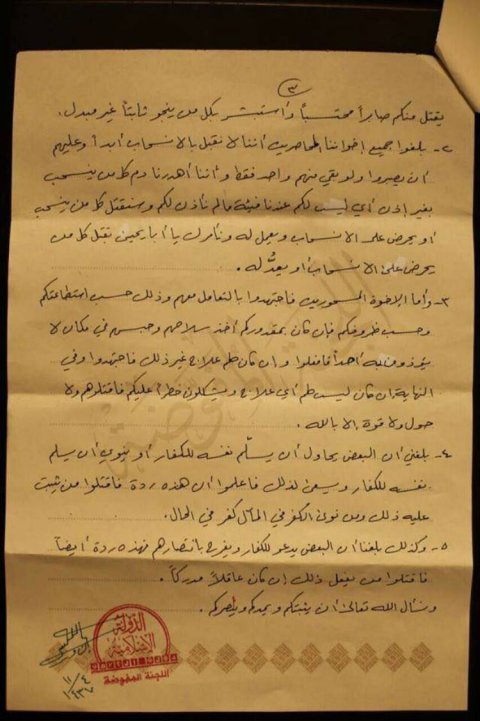
A Free Syrian Army rebel in southern Turkey passed images of the note to Newsweek after obtaining them from a shari, or spiritual leader, of Jabhat Fateh al-Sham—the jihadi group that in July disavowed ties with Al-Qaeda and is a rival to ISIS—in the northwestern Syrian province of Idlib. The leader did not wish to disclose how he had received the communique. Both men wish to remain unidentified for security reasons.
Three experts on ISIS's administrative documentation—including Al-Tamimi—believe the letter to be genuine, though Newsweek was unable to verify the letter's authenticity because of the difficulty of obtaining reliable information from ISIS-held territory. A stamp at the end of the letter, which Al-Tamimi says appears to be authentic, indicates that it is from the group's War Committee. The War Committee is a bureau attached to a general oversight body in the radical Islamist group's leadership structure, known as the Delegated Committee, he says. The directive has sparked online chatter among supporters of rival jihadi group Al-Qaeda, who are using the letter to demonstrate the greater brutality of ISIS to like-minded radicals in a bid to counter the group's appeal.
The letter contains an acknowledgement from the ISIS leadership that not only are there fighters who wish to leave the caliphate, but also those who want to "hand themselves over to the kuffar," or disbelievers—a reference to enemy forces. It indicates a wider problem of low-morale within the group's ranks as it comes under increased military pressure from the U.S.-led coalition. The emir offers instructions in how to deal with these members, and a religious justification for doing so.
"Know that this is apostasy, so kill whoever it is established is doing this," he writes, "for whoever intends disbelief in the future has disbelieved in the present."
The emir also identifies a section of people, likely locals, who were allegedly supporting forces fighting ISIS in Manbij and "rejoicing in their victory." He tells al-Shami again that "this is also apostasy," so he must, "kill the one who does that if he is of sound mind and aware."
The emir writes of "brothers who are bewitched," using the Arabic word almas'hureen. Experts say this is the first time they have heard ISIS, or even Al-Qaeda, use this term to describe their fighters.
"Strive to work with them…take their arms and confine them in a place where they cannot harm anyone," the emir writes about those who are supposedly under the spell of magic. "And if there is a cure besides that, so strive to do that, and if in the end there is no cure and they constitute a danger to you, kill them."
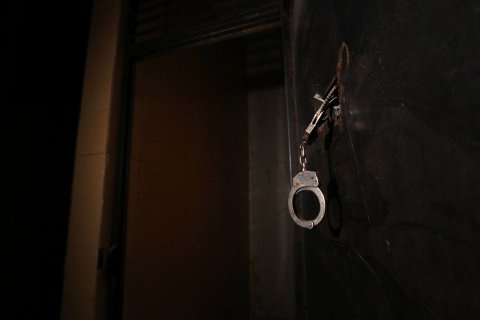
Theories among analysts vary regarding what the emir means by bewitched; it could include fighters who have become disaffected with the group's ideology, or fighters who are psychologically affected by conflict. Abdullah Al-Saud, visiting research fellow at the U.K.-based International Center for the Study of Radicalization, suggests the "bewitched" fighters could be a division within ISIS who have been "brainwashed…to conduct special operations, and they need special treatment in some way." Al-Said's reasoning is that the emir refers to dissenters in a separate clause in the letter and therefore must be referring to another set of fighters within ISIS's Manbij ranks.
"It is a binary 'you're with us or you're against us' and there is nothing in between, which is consistent with much of what we have seen [from ISIS] in recent months," says Charlie Winter, senior research fellow at U.K.-based think tank the International Center for the Study of Radicalization. He adds that the letter appears to be "the real deal" with no sign of forgery. "I think that [the same message to fighters] would be reflected in any battle to defend Mosul, a similar push towards removing dissenters, removing potential fifth column individuals from the mix so they cannot cause damage from within."
ISIS's ruthlessness when disciplining its own fighters seemingly extended to Mosul ahead of the U.S.-Iraqi offensive. There has been an uptick in brutal videos from inside the city and the surrounding Nineveh region in recent months. The group has publicly executed alleged spies, accusing them of passing information to enemy forces, the coalition and Kurdish fighters, known as the peshmerga. Reports have also emerged of a rebellion from inside the city, led by an aide to ISIS caliph Abu Bakr al-Baghdadi, that ISIS crushed by drowning 58 suspects and burying them in a mass grave. The intimidation appears to be aimed at retaining its members—dissuading them from harming the group internally or aiding its adversaries—as opposed to attracting new recruits, Winter adds.
In the letter, the War Committee's emir employs tactics of persuasion to boost the morale of the group's key commander in Manbij. He writes of his own purported past experience in Fallujah, the western Iraqi city ISIS held but lost to U.S.-backed Iraqi forces in May, and how he has "gone through…the worst of what you are going through." He recounts the horrors he witnessed, saying that he saw the "brain of one of our brothers come out of his head," and spent 75 days "without water, food and medicine."
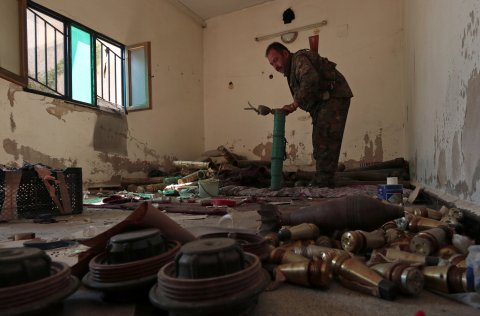
But the letter is also significant because the emir's orders to the besieged in Manbij to "endure and fight until you are killed or God gives you victory" were ultimately ignored. The remaining ISIS fighters eventually withdrew and abandoned the city when the Syrian Democratic Forces liberated it on August 12. They did not fight to the death. That raises questions about whether the group will now stay to the last in Mosul as it again finds itself penned in by U.S.-backed forces and U.S. air power.
"There came a time [in Manbij] when staying and dying ceased to be the only thing allowed. The question is whether, in Mosul, the same thing could happen," says Cole Bunzel, a scholar at Princeton University studying Islamic history and jihadist ideology.
"I assume they will fight with much greater tenacity for Mosul than they did for Manbij, as the stakes are that much higher. The Islamic State will make us pay for taking Mosul, but at the end of the day even [in Mosul] some sort of calculated withdrawal is a possibility."
Plans for such a withdrawal have already begun. Fighters have dug tunnels underneath the city to aid their escape and they have planted booby traps to slow the entrance of enemy forces into the city's perimeter, according to Iraqi and U.S. officials. But the battle to reclaim the city won't be so easy. A Quranic verse at the beginning of the letter offers the starkest warning to Baghdad's forces of the resistance they can expect to face as they edge further into the country's second city.
"You were expecting death before encountering it, but now you have seen it while looking on," it reads to al-Shami, and then goes on to reference prophets who fought in the name of their religion. "They did not lose resolve for what afflicted them in the path of God and they did not become weak or submit. God loves those who endure." Mosul is known as the City of Two Springs as the autumn months are said to be as glorious as the spring. But this season could be the bloodiest the city has ever seen.
This article has been updated to reflect the beginning of the operation to liberate Mosul on October 17 2017.









